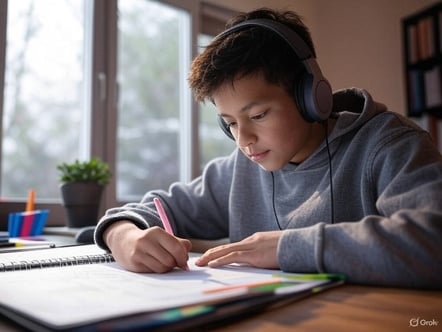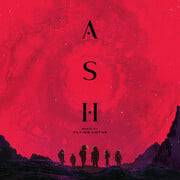New York, NY (Top40 Charts) Students are forever looking for ways to enhance study skills in today's fast-moving world. Music is one of the best but least appreciated tools for enhancing concentration and creativity. Be it classical pieces, ambient electronica, or lo-fi tracks, the proper type of music can dramatically affect brain functioning. This article delves into how music affects concentration and creativity while studying, supported by scientific facts and practical tips.
How Music Influences the Brain
Music significantly influences brain activity, influencing cognitive function, emotions, and memory. Studies show that listening to music stimulates the reward system of the brain, releasing dopamine, a neurotransmitter associated with pleasure and motivation. This can help students stay focused and motivated during long study sessions.
Studies also show that music has the power to stimulate certain cognitive processes. For example:
Classical music is said to increase spatial-temporal thinking and improve problem-solving skills.
Lo-fi beats and ambient textures can create a calming atmosphere, reducing stress and increasing productivity.
Instrumental music minimizes distractions since it doesn't contain lyrics that can get in the way of verbal processing tasks.
The Mozart Effect: Myth or Reality?
The phrase "Mozart Effect" was all the rage in the 1990s when researchers suggested that listening to the music of Mozart would make people smarter. Though later research discredited the frenzy, there remains proof that classical music can be used to refine concentration and mind power. Students who listened to Mozart were discovered to score higher on spatial IQ tests in one study published in Nature.
Although the advantages of classical music have been well attested, do not forget that individual taste contributes a great deal. The art is to find music that isn't distracting but helps create flow.
Music to Concentrate On: What Helps Most?
There is not the same music created equal when sitting down to study. These types of music and genres have proven to improve focus:
- Classical and Baroque Music
Tracks from artists such as Bach, Beethoven, and Vivaldi can offer relaxing but mentally stimulating ambiance. Baroque music particularly has been shown to be linked with improved focus due to the steady pace and lack of lyric distractions.
- Lo-Fi and Chillhop
Lo-fi music, slow-paced, soft-beat music with ambient sounds, has become extremely popular among students. It can be utilized to offer a relaxing study environment that alleviates stress and enhances concentration.
- Ambient and Nature Sounds
Nature sounds, such as rain, ocean waves, or bird chirps, are found to enhance concentration by eliminating unnecessary background noise and offering relaxation to some students.
- Instrumental Jazz and Soft Electronic Music
Instrumental jazz and soft electronic beats provide a stimulating but not disturbing environment for learning. Both music genres help maintain a steady rhythm without dominating the listener.
The Relationship between Music and Creativity
Aside from improving concentration, music can also boost creativity. Music stimulates the right side of the brain, the region responsible for creativity and problem-solving. Psychology of Music says that background music can enhance divergent thinking, a central component of creativity.
For creative problem-solving, certain types of music are particularly useful:
- Jazz and improvised music stimulate creative idea generation and free thinking.
- Electronic and ambient music build an open-ended auditory space that stimulates imagination.
- World music using different instruments and rhythms has the ability to stimulate new thoughts and innovative ideas.
At times, students are overwhelmed with studies and look for reliable assistance to maintain their performance. The majority opt for professional services that deliver "do my assignment" requests, keeping their work appropriately researched, arranged, and delivered within deadlines.
Finding the Right Balance: Music vs. Silence
Although music is an excellent way to learn, sometimes it is not. Certain learners may like complete quiet, especially for complex tasks that require a high level of concentration. A better strategy is to experiment with different types of music and environments and observe what is most appropriate for individual learning styles.
A helpful technique is to use the Pomodoro Technique, where students work intensely (e.g., 25 minutes) in response to music, then take brief breaks in silence. This helps the brain recover and absorb information in a better way.
Music and Academic Achievement: What Research Suggests
There have been many researches done regarding the impact of music on academic performance:
- A study by Stanford University determined that music stimulates areas of the brain employed in attention and anticipation, which are both significant when learning.
- A study conducted by the University of Wales demonstrated that students achieved more on memory tasks when listening to instrumental music as opposed to music with lyrics.
- A meta-analysis published in Scientific Reports revealed that background music could enhance cognitive performance if it doesn't have distracting elements like complex lyrics.
Practical Tips on How to Utilize Music while Studying
For those students who are interested in using music while studying effectively, certain essential tips are:
- Choose the Right Playlist: Listen to instrumental, lo-fi, or classical music to minimize distractions.
- Keep the Volume Low: Music should be in the background, not foreground.
- Try Different Genres: Try different genres and find out what works best for different types of tasks (e.g., analytical vs. creative work).
- Use Headphones: This will ensure that outside noise is kept out and a more stimulating study session is created.
- Don't Use Music with Lyrics: Words will interfere with reading and comprehension practice.
- Use Music Apps: Pre-curated study playlists are offered by streaming platforms like Spotify and Apple Music to enhance focus and productivity.
Conclusion
Music is a powerful tool that can improve focus and imagination during study. Through the right music, students can create the perfect study environment that improves focus, reduces levels of stress, and enhances imagination. Whether it is through symphonies of classical music, lo-fi tunes, or ambient music, the right soundtrack has the power to turn a boring study session into an effective and interactive experience.
























